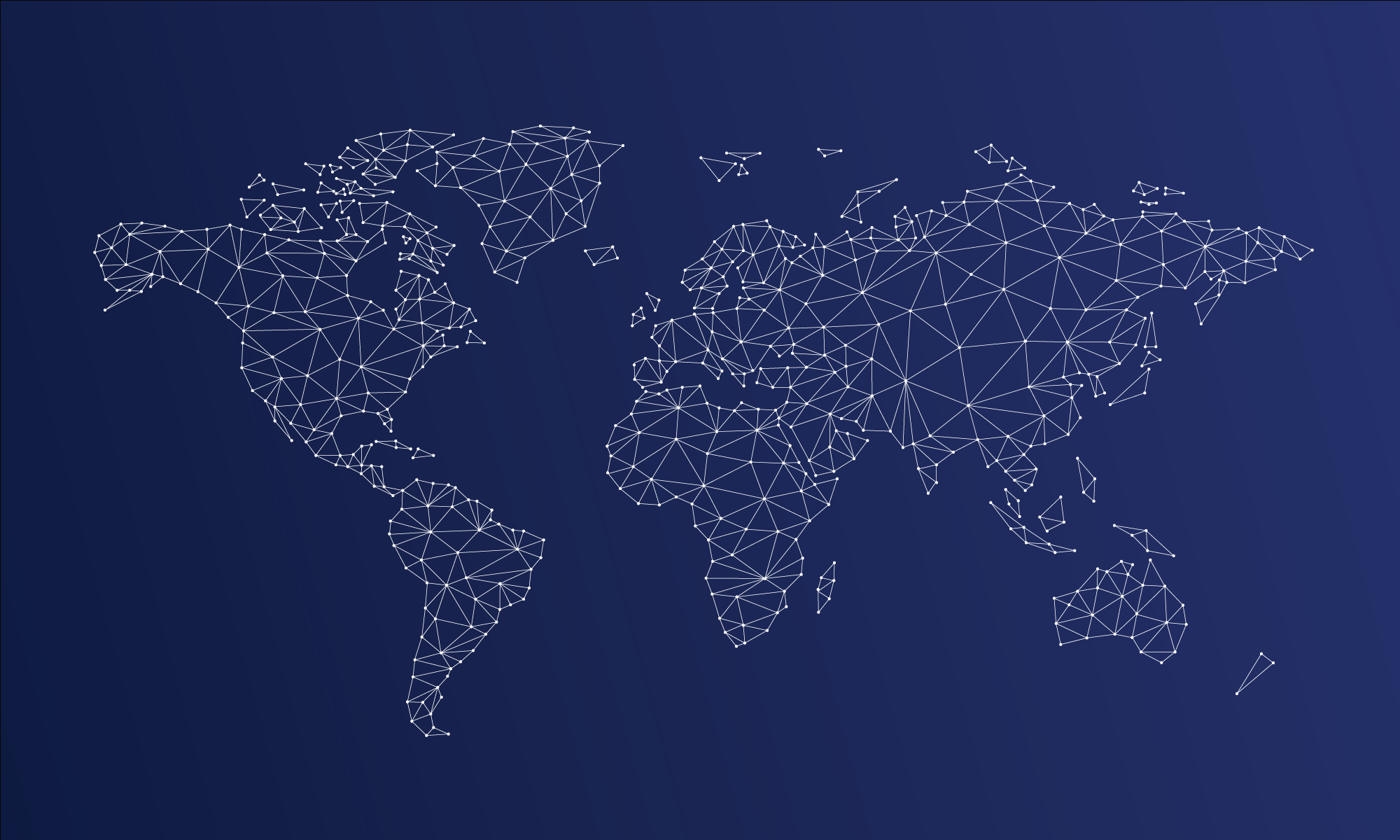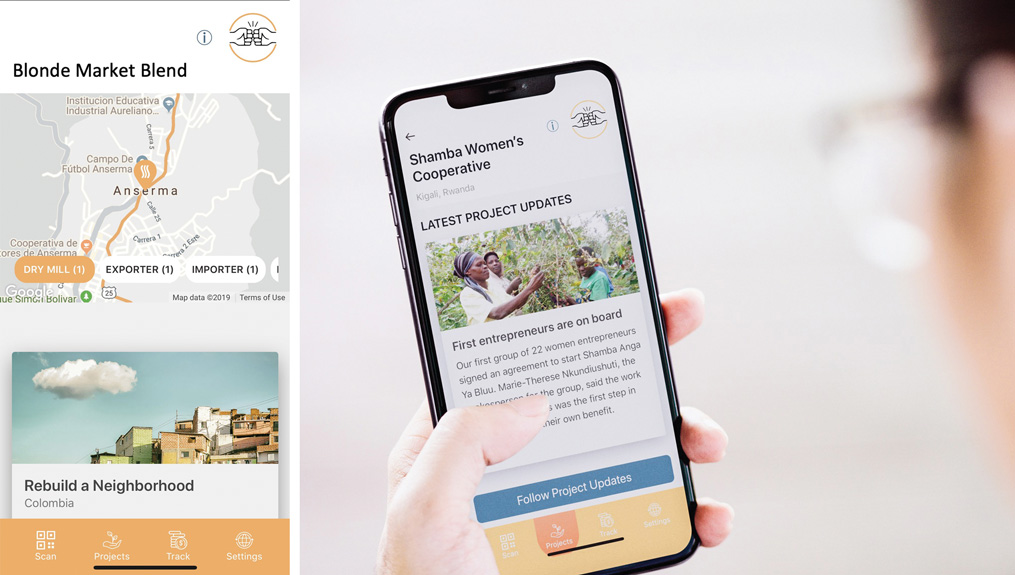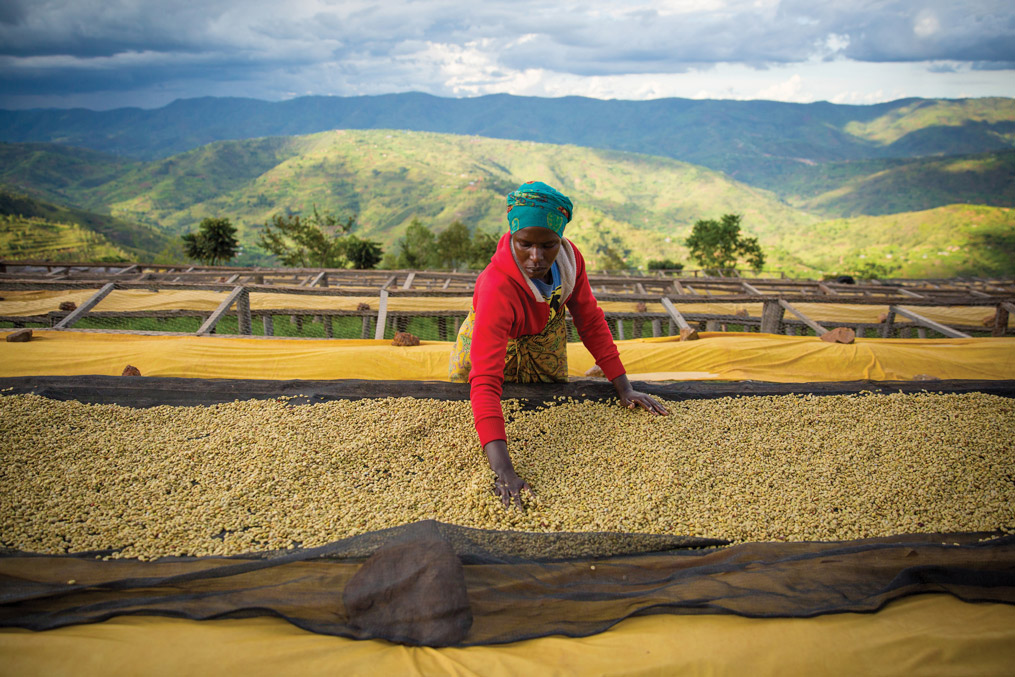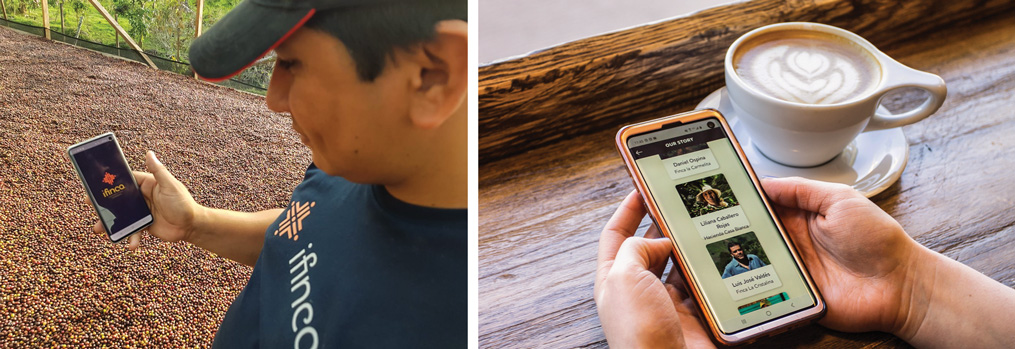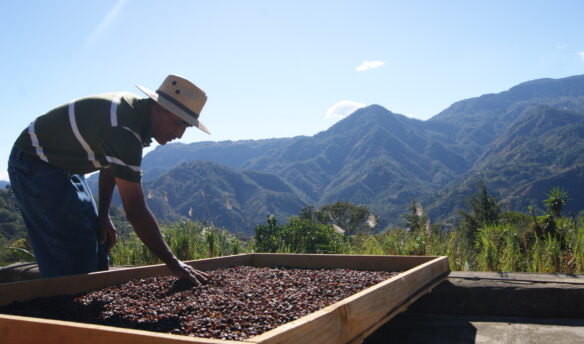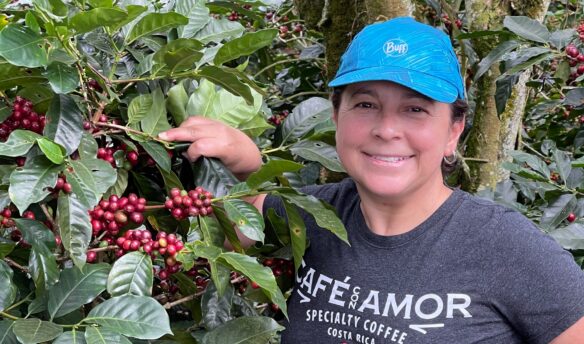The high-tech innovation transforms how coffee goes from farm to cup—and ensures growers unprecedented supply chain transparency.
The coronavirus pandemic is taking a toll on coffee farmers.
As cities went into lockdown and coffee shops and restaurants closed, sales plummeted—and growers feared coffee prices would follow. In coffee-producing regions, 68% of coffee growers cited the price of coffee as one of their biggest worries and 21% called COVID-19 one of the greatest issues facing smallholder farmers, according to research from Hanns R. Neumann Stiftung, a German nonprofit organization supporting grassroots projects on coffee farms across the globe.
Coffee farmers also struggled with disruptions to the global supply chain as workers contracted COVID-19, processors closed, exports stalled, and farmers lost access to valuable international markets.
A burgeoning technology called blockchain could help.
The protected digital ledger could provide much-needed transparency that helps everyone from farmers to roasters anticipate and prevent disruptions to the supply chain. Blockchain may also help farmers streamline operations and increase revenues.
Blockchain serves as a protected digital ledger, according to Alexander D. Barrett, CEO of the data verification firm iFinca. Once information is entered into the platform, it cannot be altered.
“If you write something down on a piece of paper, hand it to someone else who writes something down and it goes to eight more people who all write something down on the same piece of paper,” he explains. “With blockchain, the tenth person who receives that piece of paper knows that nothing has been changed.”
A new report, Food for Thought: Mapping the Food and Beverage Supply Chain with Blockchain, notes that, “Rather than being stored in one place, data is distributed on an open, peer-to-peer network…creating a permanent data log that can easily be tracked and referenced.”
Blockchain was introduced long before the global coronavirus pandemic took hold. Now, the platforms are helping growers innovate and pivot by sharing data, helping farmers connect directly to shippers, distributors, and retailers, and distributing funds.
These four companies have created blockchain platforms aimed at supporting coffee growers.
FARMER CONNECT: farmer connect is an agritech start-up and innovative supply chain technology provider. The farmer connect traceability platform is powered by IBM Blockchain designed to help increase transparency, efficiency, and fairness in the coffee supply chain. Farmers can use the Farmer ID app to prove their identity and income to lenders, increasing access to loans; Farmer Connect also allows growers to store and share information about their products with co-ops, exporters, importers, and traders—all on a safe, secure platform.
Top coffee organizations such as The Colombian Coffee Growers Federation, Sucafina, Yara International, and RGC Coffee have collaborated on the blockchain solution launched by farmer connect earlier this year.
As part of a partnership with J.M. Smucker, farmer connect is being used to trace a single-source coffee brand. Consumers who purchase the Folgers 1850 single-origin Colombian coffee can use the QR code on the packaging to access information about the origin of the beans, roasting dates, shipping ports, and more. farmer connect also provides details about projects such as sustainable agriculture initiatives and other sponsored efforts to support coffee producers.
“The aim is humanizing each coffee drinker’s relationship with their daily cup,” says David Behrends, head of Sucafina and founder and president of farmer connect, in a press statement. “Consumers now can play an active role in sustainability governance by supporting coffee farmers in developing nations. Through the blockchain and this consumer app, we’re creating a virtuous cycle.”
STARBUCKS: In 2019, Starbucks announced a partnership with Microsoft to trace beans from farm to cup—and share that information with consumers.
The international coffee company works with 380,000 coffee farms across the globe and blockchain can provide secure data and real-time traceability to consumers who are interested in knowing more about the origins of their coffee beans. Blockchain also benefits farmers by providing details about where their beans go after they leave the farm.
In a press statement about the innovation, Starbucks quotes Marcel Kadende, a coffee farmer from Kigali, Rwanda, who used blockchain to trace coffee from his farms across the globe to the United States.
“I didn’t know my coffee left the country,” he says. “Access to knowledge is powerful….A farmer who doesn’t know their coffee left the country might not know their coffee is export quality. Knowing your coffee quality as a farmer is important.”
To ensure that blockchain would benefit the farmers that supplied coffee to Starbucks, Michelle Burns, Starbucks senior vice president of Global Coffee & Tea, says, “We’re…interviewing coffee farmers in Costa Rica, Colombia and Rwanda, learning more about their stories, their knowledge and their needs in order to determine how digital traceability can best benefit them.”
Starbucks rolled out its blockchain technology tool to consumers in August.
GRAINCHAIN: Honduran coffee farmers have long struggled with falling prices, lack of investment, and unstable markets; a blockchain-based tool wants to change that.
GrainChain uses blockchain to minimize risk and encourage reinvestment in coffee farms in Honduras. The platform includes a digital wallet so farmers in remote regions without access to banks can apply for loans and banks can ensure the capital is applied to projects that improve farming conditions and crops; insurance companies can use tools to automate the underwriting of loans; and exporters use the tool for contracts and settlements. Farmers can also cut out middlemen and sell directly to buyers, increasing their earnings.
An estimated 10% of Honduran coffee growers have signed on to use blockchain in their operations and the platform has completed more than 84,000 transactions representing in excess of 5.2 million pounds of coffee.
“Our platform provides guarantees and visibility through the entire process, which empowers growers and vendors while reducing risk to bankers and buyers,” says Luis Macias, CEO of GrainChain, in a statement. “We believe that building agricultural industries with blockchain tools will encourage reinvestment and improve quality throughout by giving people a single platform they can trust.”
IFINCA: Blockchain solutions have the power to keep track of a complex paper trail, creating a digital file that tracks information about prices, moisture levels, weight, and cupping notes and traces coffee beans through the entire supply chain.
The iFinca platform launched in October 2019 and has grown to include more than 14,000 farmers as well as 38 exporters, 14 importers, 26 roasters, and 19 cafés in seven countries, including Colombia, Guatemala, El Salvador, Ethiopia, Uganda, Haiti, and the Dominican Republic.
Barrett believes that creating a single, accessible ledger to verify purchases and reduce inefficiencies could help coffee farmers earn a larger share of the overall value of their crop. The biggest benefit: access to farm-gate prices.
iFinca is in the process of aggregating data about prices by country, varietal, and cup score, and working hand-in-hand with CoffeeChain to disclose prices so farmers have transparent access to pricing data. Barrett compares the tool, which rolls out later this year, to the Kelley Blue Book pricing for cars.
“We want farmers as equal stakeholders; they get information on pricing that gives them a much more powerful position for bargaining; it levels the playing field,” he says. “When consumers can see what the farmer was paid, they don’t mind paying an extra five cents on their $4 cappuccino.”
Blockchain doesn’t guarantee transparency or traceability; it simply provides protected data. But, when properly leveraged, Barrett notes that it could be used to ensure that farmers are properly compensated for their coffee beans.
“I’d love to be able to touch all of the small stakeholders globally,” he says. “This will be a new industry standard.”



